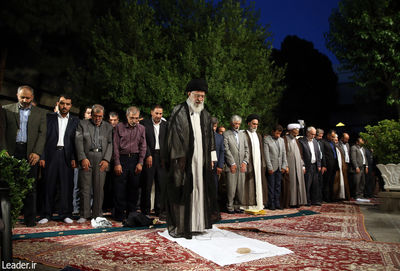On the auspicious birth anniversary of Imam Hassan Mojtaba (peace be upon him), a member of the household of Prophet Muhammad (PBUH), a group of people of culture, masters of Persian literature and poetry and the country’s young and veteran poets as well as a number of poets from India, Afghanistan and Turkey met with Leader of the Islamic Revolution Ayatollah Seyyed Ali Khamenei.
In the meeting, Ayatollah Khamenei expressed pleasure with the growing and progressive trend of the country’s poetry and described poetry as a “national asset”, adding, “Since the outset of the [1979] Revolution, there have been efforts to steer poetry in the direction of objectives other than those of the Revolution and those efforts still continue to be made.”
The Leader of the Islamic Revolution described the predominant poetic movement in the era prior to the Islamic Revolution as serving concepts other than “national awareness and awakening,” saying, “In the literary environment of those days, most of the people professing modernism and modernity, offered no contribution to the country’s progress and true and proper revitalization.”
He described the victory of the Islamic Revolution as the beginning of a new poetic era and the initiation of motivated youth and poets into the composition of “insight-boosting poetry at the service of the country’s goals,” adding, “The expanse of these poets increased day by day and fortunately, today, the dominance lies with poetry compatible with religious and revolutionary objectives as well as growing and progressing poems.”
Ayatollah Khamenei described “inertia and the assumption of having reached the final station” as a deadly poison for poets and reiterated, “The tree of the country’s poetry enjoys much greater potential and capacity for prosperity and growth and greater effort and attention must be paid to ‘identifying of the themes, improving the terminology and conveying the contemporary concepts’.”
Pointing to the weakness present in reporting the country’s events and the state of national figures, the Leader of the Islamic Revolution described Iranians as suffering from indolence and laxity in this regard, saying, “Our honourable Imam (later founder of the Islamic Republic Imam Khomeini) is a top-notch individual whose greatness is acknowledged by friend and foe, but how many books have been written about this supreme figure?”
He described Syria’s developments and the Defenders of the Shrine [active in Syria and Iraq] and the important issues of Iraq as worth composing hundreds and thousands of poems, adding, “Most of the people are uninformed about the objective that the Americans entertained in Iraq and how they went down there. And the issue that how ‘the Saddam-era Iraq’ turned into ‘one belonging to Martyr Hakim’, is very important and in need of clarification.”
Ayatollah Khamenei urged poets to “create collections” from topics and to compose poetry in the field of “satire” on some of the bizarre issues of today’s world and added, “The Holy Prophet (PBUH) ordered one of the poets in his disciples to satirize polytheists and today cases such as the sword dance of ‘modern Jahiliyyah (ignorance)’ alongside ‘tribal Jahiliyyah’ or the inclusion of a government such as that of Saudi Arabia in the United Nations Human Rights Council are issues that seriously deserve to be satirized.”
In the meeting, 30 poets recited their poems in the presence of the Leader of the Islamic Revolution.
They also held the Maghrib and Isha prayers led by the Leader of the Islamic Revolution and broke their fast alongside him.
Source: leader.ir

